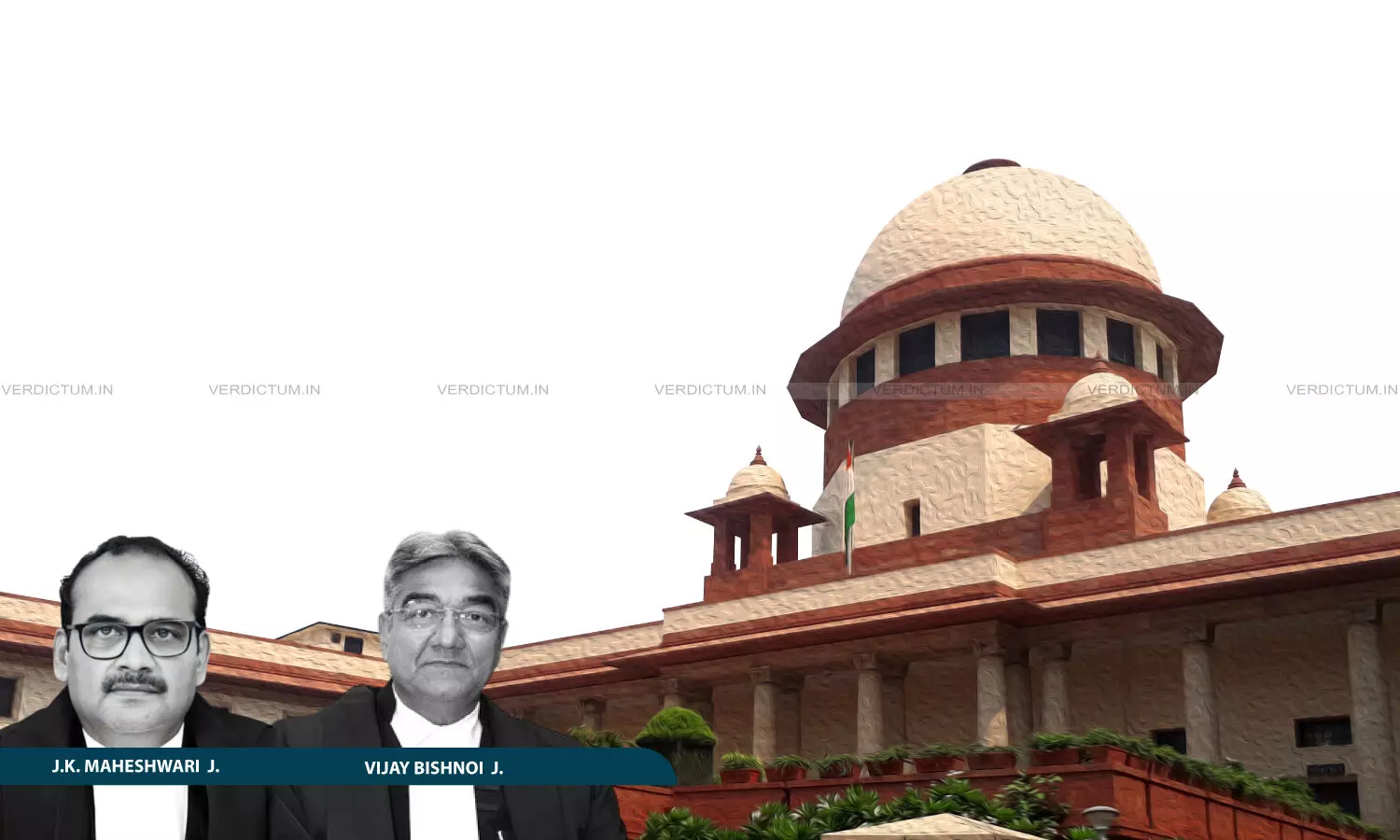
Justice J K Maheshwari, Justice Vijay Bishnoi, Supreme Court
Absence From Duty On Various Occasions In Short Tenure Of Service Is Gross Indiscipline: Supreme Court Upholds Dismissal Of Constable
 |
|The Supreme Court said that the penalty of dismissal is a consequence of proved misconduct.
The Supreme Court has upheld the dismissal of a Constable from Punjab, saying that the absence from duty on various occasions in short tenure of service is gross indiscipline.
The Court was deciding a Civil Appeal preferred by the State, challenging the Judgment of the Punjab and Haryana High Court.
The two-Judge Bench comprising Justice J.K. Maheshwari and Justice Vijay Bishnoi observed, “As observed, in the present case, the absence of the respondent from the duty on various occasions in a short tenure of service of around 7 years, is a gross indiscipline on the part of the respondent and therefore, we do not find any illegality in the order passed by the disciplinary authority whereby the services of the respondent have been dismissed.”
The Bench said that the penalty of dismissal is a consequence of proved misconduct.
DAG Talha Abdul Rehman appeared on behalf of the Appellants while AOR Manju Jetley appeared on behalf of the Respondent.
Brief Facts
The Respondent was appointed as a Constable in the Punjab Armed Forces in 1989. In the year 1992, he was transferred to the Commando Force and was posted at Bahadurgarh, Patiala Headquarter of the 2nd Commando Battalion. He applied for five days leave, however, was granted leave only for one day. He proceeded to leave on April 2, 1994 but did not join his duties on April 4, 1994, and instead resumed his duties only on May 12, 1994. The allegation against the Respondent was that he remained absent for around 37 days. Hence, the departmental enquiry was initiated and a chargesheet containing allegations along with a list of prosecution witnesses was served upon him. The enquiry officer concluded the enquiry and submitted his report.
Pursuantly, a show-cause notice (SCN) was issued by the Commandant, 2nd Commando Battalion, Bahadurgarh, Patiala. However, the Respondent did not file any response to the same and resultantly, the disciplinary authority dismissed him from service and ordered for treating the period of absence as non-duty period. The Respondent approached the Appellate Authority, which dismissed his Appeal. His Revision Petition before the Revisional Authority was also rejected. Then he instituted a suit for declaration and mandatory injunction, but it was also dismissed by the Additional Civil Judge (ACJ). His First Appeal was dismissed by the District Judge and hence, he went to the High Court which decided the case in favour of the Respondent. Hence, the case was before the Apex Court.
Reasoning
The Supreme Court in view of the above facts, noted, “In light of the judicial precedents cited above, when the factual matrix of the present case is appreciated, it is seen that the reference to the fact of forfeiture of 17 years of service of the respondent as a result of his absence from service on previous occasions was in exclusion or independent of the misconduct for which the enquiry officer has found him guilty. The consideration of the past misconduct of the respondent was not the effective reason for dismissing him from the service.”
The Court added that the disciplinary authority had mentioned the past misconduct of the Respondent only for adding the weight to the decision of imposing the punishment.
“We have perused the show cause notice and the order of dismissal passed against the respondent. After going through the same, it is clear that penalty of dismissal is a consequence of proved misconduct. Therefore, the order impugned is within the first part of Rule 16.2 (1) of the Rules. While passing the order dismissing the appeal, the disciplinary authority recorded the finding that the act of absence of the respondent from duty is a grievous act of misconduct”, it said.
The Court remarked that the Respondent was dealt by the department earlier on three occasions having remained absent from duty and the penalties were inflicted for the same and it is the fourth time when he remained absent to which, a chargesheet was issued and his guilt was found proved.
“He himself had not cross-examined the departmental witnesses and also had not produced any witness in his defense. Considering all these aspects and having found proved his misconduct, notice to show cause from dismissal was issued to the respondent. The disciplinary authority, while imposing the penalty, had merely referred the past conduct and also given weight to the gravest act of misconduct”, it added.
Conclusion
The Court observed that the order of dismissal is not based on the charge of “cumulative effect of continued misconduct proving incorrigibility and complete unfitness for police service”, and therefore, mere reference of the past conduct would not amount to constitute dismissal of the Respondent based on the second limb of Rule 16.2(1).
“In our view, the High Court was not justified to apply the principle of K. Manche Gowda (supra) while setting aside the judgment passed by the two Courts. As such, it is concluded that the dismissal of the respondent was based on gravest act of misconduct, for which he was dealt with by the disciplinary authority following the procedure as prescribed and in due observance of principles of natural justice, hence, we do not find any fault in the same”, it concluded.
Accordingly, the Apex Court allowed the Appeal and set aside the High Court’s Judgment.
Cause Title- State of Punjab and Others v. Ex. C. Satpal Singh (Neutral Citation: 2025 INSC 1056)
Appearance:
Appellants: DAG Talha Abdul Rehman, AOR Nupur Kumar, and Advocate Sudhanshu Tewari.
Respondent: AORs Manju Jetley, Varun Punia, Advocates Jetendra Singh, Vijendra Kumar Kaushik, Priyanka Singh, and Deepti Singh.